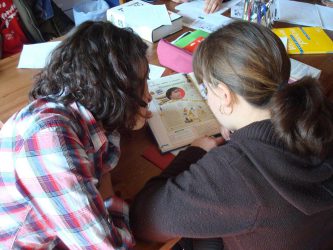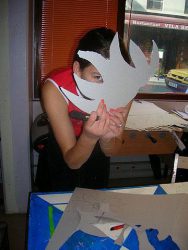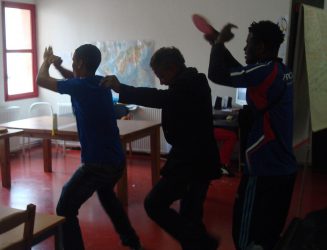
Hors la Rue
Hors la Rue
Projekttitel
Trennung und Schutz junger Opfer
Standorte
Montreuil, Frankreich
Zielsetzung
Das laufende Projekt von Hors la Rue weiterhin unterstützen, das direkt auf die Bedürfnisse von Kind Opfern des Menschenhandels in Paris eingeht. Das Projekt zielt darauf ab, die französische Regierung dabei zu unterstützen, Kinder, die Opfer von Menschenhandel wurden, besser zu identifizieren. Außerdem soll es die Bedürfnisse der Kind Opfer unterstützen und ihnen Reintegration, psychosoziale Betreuung, medizinische Versorgung und Bildung bieten, um ihnen eine Rückkehr in die Gesellschaft zu ermöglichen.
BESCHREIBUNG DES EMPFÄNGERS
Hors la Rue arbeitet seit acht Jahren mit kindlichen Opfern von Menschenhandel, speziell zur Unterstützung gefährdeter Migrantenkinder in Paris und Umgebung. Die Mission der Organisation ist es, diesen Kindern den Übergang zu allgemeinem Wohlbefinden zu erleichtern. Hors la Rue hat Erfahrung in der Zusammenarbeit mit Regierungen in Europa und hat starke Partnerschaften mit Regierungsstellen in Bosnien-Herzegowina und Rumänien aufgebaut. Die Organisation ist Mitglied nationaler und internationaler Netzwerke von NGOs, die gemeinsam gegen Menschenhandel kämpfen.
BESCHREIBUNG DES PROJEKTS
Das französische Recht behandelt jugendliche Opfer von Menschenhandel anders als erwachsene Opfer; sie werden oft als straffällige Kinder angesehen und nicht als Opfer von Menschenhandel. Außerdem sind die Notunterkünfte, in die solche Kinder normalerweise kommen, oft von Kriminellen durchsetzt, und die Unterkünfte bieten keine Reintegration oder notwendige Betreuung (psychosozial, medizinisch etc.), die diese Kinder brauchen. Dieses Projekt will diese Schwachstellen beheben durch: (a) Unterstützung staatlicher Akteure bei der besseren Identifikation von kindlichen Opfern durch Schulungen und Kapazitätsaufbau; (b) Bereitstellung spezialisierter und individueller Betreuung und Unterstützung für diese Kinder; (c) Unterstützung bei der Suche nach geeigneten und passenden Unterkünften.
Hors la Rue ist spezialisiert auf die Identifikation isolierter und unbegleiteter minderjähriger Ausländer, die außerhalb des regulären staatlichen Kinderschutzsystems leben und daher einem hohen Ausbeutungsrisiko ausgesetzt sind. Die Aktivitäten von Hors la Rue zielen darauf ab, diesen Jugendlichen Zugang zu dem Schutz zu verschaffen, der ihnen durch die 1990 von Frankreich ratifizierte Kinderrechtskonvention zusteht.
3. Bewertung der Umsetzung und Überwachung der Projektaktivitäten
3.1. Im Berichtszeitraum durchgeführte Aktivitäten
Historisch arbeitet die Organisation hauptsächlich mit Jugendlichen aus Osteuropa und/oder der Roma-Gemeinschaft, die in und um Paris leben. Hors la Rue arbeitet vor allem mit Minderjährigen im Alter von 9 bis 17 Jahren – das Durchschnittsalter liegt bei 14 Jahren. Im zweiten Quartal 2012 stellte die Organisation fest, dass zunehmend jüngere Kinder als gefährdet identifiziert werden. Im Berichtszeitraum arbeitete Hors la Rue mit etwa sechzig Jugendlichen und führte folgende Aktivitäten durch:
Tageszentrum
Viele der Jugendlichen, die das Zentrum aufsuchen, haben Missbrauch und/oder Ausbeutung erlebt und kämpfen oft mit schweren emotionalen Problemen. Das Zentrum bietet diesen Jugendlichen eine sichere, stabile und konstante Betreuung. Es ist von Montag bis Donnerstag von 10 bis 17 Uhr geöffnet und betreut durchschnittlich 16 Jugendliche täglich im Alter von 10 bis 18 Jahren. Das Zentrum dient als Treffpunkt für Pädagogen, um den Jugendlichen bei Problemen zu helfen und den Kontakt zu ihren Familien wiederherzustellen. Es werden grundlegende Einrichtungen wie nahrhafte Mahlzeiten, Duschmöglichkeiten und Waschgelegenheiten angeboten.
Notunterkünfte
Opfer von Menschenhandel oder gefährdete Jugendliche benötigen sichere Unterkünfte, um sie vor weiterer Ausbeutung zu schützen. Hors la Rue arbeitet mit relevanten Regierungs- und Kinderhilfsorganisationen zusammen, um gefährdeten Jugendlichen sichere Zufluchtsorte bereitzustellen.
Bildung
Das Team konzentriert sich darauf, das Verständnis der Jugendlichen für Ausbeutung und Rekrutierung durch kriminelle Banden zu verbessern. Viele der Minderjährigen hatten keine Schulbildung, was ihre Anfälligkeit für Ausbeutung erhöhte. Um die Integration in das französische Schulsystem zu fördern, bietet Hors la Rue auch Französischunterricht an.
Hors la Rue entwickelte spezifische Hilfsmittel, um die verschiedenen Phasen der Ausbeutung besser zu verstehen und den Jugendlichen umfassende und maßgeschneiderte Unterstützung zu bieten.
Psychologische Betreuung
Ein Psychologe bewertet regelmäßig den psychischen Zustand der Jugendlichen, sowohl auf der Straße als auch im Tageszentrum. Die dabei gewonnenen Erkenntnisse helfen, ein realistisches Profil der Jugendlichen zu erstellen und die Ursachen für Obdachlosigkeit und Ausbeutung besser zu verstehen.
Gesundheit und medizinische Versorgung
Kinder, die auf der Straße leben und arbeiten, sind besonders anfällig für Gewalt, Missbrauch und Ausbeutung. Das Tageszentrum bietet daher wöchentliche Informationsveranstaltungen zu Gesundheitsthemen und den Risiken von Drogenmissbrauch an. Hors la Rue arbeitet mit Médecins du Monde zusammen – einmal pro Woche ist ein Arzt vor Ort, der medizinische Anliegen behandelt.
Rechtliche Unterstützung
Das Team von Hors la Rue arbeitet mit Jugendlichen, die straffällig geworden sind und im Justizsystem sind. Die Organisation unterstützt die Pariser Polizei, die Staatsanwaltschaft für Minderjährige und Jugendgerichtshilfe.
Fachschulungen für Behörden und soziale Dienste
Im Berichtszeitraum organisierte Hors la Rue zwei Schulungen: eine für das pädagogische Personal des Gerichts von Bobigny (Département Seine Saint Denis, 93) und eine weitere im Pariser Gericht für jugendliche Straftäter, die Opfer von Menschenhandel sind.
Koordination und Informationsaustausch
Um eine umfassende Unterstützung zu gewährleisten, arbeitet Hors la Rue eng mit Institutionen wie dem Justizministerium, der Polizei, den Kinder- und Jugendhilfen, der Minderjährigenschutz-Einheit, der Staatsanwaltschaft für Minderjährige, Pariser Polizeistationen und Bildungseinrichtungen zusammen.
3.4. Wesentliche Hindernisse bei der Projektumsetzung
Die Organisation stieß auf folgende Herausforderungen:
Einige ausgebeutete Jugendliche werden von Polizei und Justizbehörden gelegentlich als jugendliche Straftäter behandelt. Um die Koordination zwischen Polizei, Justiz und Kinderschutz zu verbessern, hat Hors la Rue einen multi-institutionellen Ansatz für Intervention und Schutz entwickelt.
Behörden fehlt teilweise eine ausreichende Schulung und Sensibilisierung im Umgang mit gefährdeten ausländischen Jugendlichen, die einem Ausbeutungs- und Missbrauchsrisiko ausgesetzt sind.
Aufgrund der hohen Anzahl an hilfesuchenden Jugendlichen hat die NGO weniger Ressourcen für andere Aktivitäten wie Schulungen zur Verfügung.
Weitere Informationen finden Sie unter: http://www.horslarue.org.


